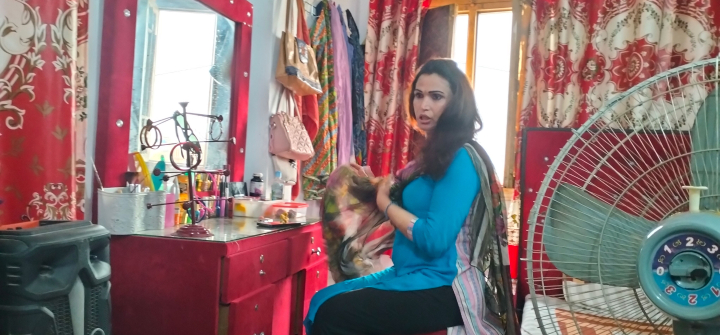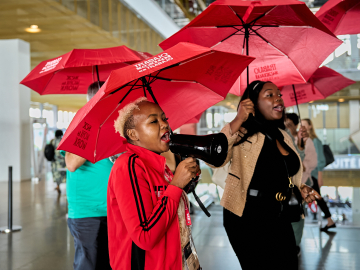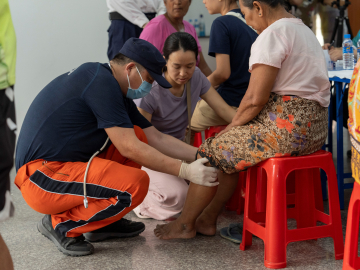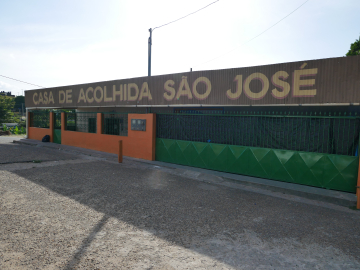Pakistan’s Trans Community Is Especially Vulnerable to Climate Crises
PESHAWAR, Pakistan—On a muggy July night, Shama fell unconscious on the city’s ring road while returning to her apartment after performing a dance at a wedding celebration.
The temperature topped 42°C (107°F). Her clothes were soaked in sweat. Her neighbors found her a short time later and rushed her to a nearby hospital.
The timely rescue and medical care helped Shama, an emaciated transgender person, recover from severe dehydration. But the threat hasn’t gone away.
“Survival in such sizzling heat with scarce resources to cool off seems impossible to me,” laments Shama, who goes by just a first name. “I am continuously experiencing shortness of breath and nausea caused by the humidity and dampness in the small room I share with three roommates.
Climate extremes including heat waves and floods affect almost everyone in Pakistan, but people who are transgender suffer disproportionately because of stigma that limits education, work, and housing options, and pushes them to the margins of Pakistan’s society.

A dressing table belonging to a group of transgender people outside a home in Pakistan's Nowshera district. September 2022. Adeel Saeed
“We spend restless days and sleepless nights subjected to unbearably scorching heat,” Shama says—with no respite. Fans, room coolers, or air conditioners cannot be used for 12–15 hours a day because of electricity load shedding (controlled outages mandated by the power company). Some people can afford generators or solar power to run cooling devices during the long electrical outages, but they aren’t an option for Shama and other transgender people living in abject poverty.
When Shama seeks refuge from the sweltering heat in green, shady areas near the main road, she is met with sneering remarks, taunting, and even physical harassment by young people, forcing her to return home to rooms baked by the blazing sun.
“The climate crisis has exacerbated the suffering of the trans community, which was already embroiled in a battle against poverty, stigma, marginalization, and violence,” says Farzana Riaz, co-founder and president of TransAction, an organization founded in 2015 to end discrimination and violence against the transgender community.
Most transgender people, Riaz notes, are disowned by their families and have little opportunity for education. Because of the difficulty in finding stable work, many try to survive by performing dances at parties, begging in public places, or resorting to sex work.
The social stigma against them also restricts their housing options. They are largely confined to rented accommodations in isolated places, such as temporary shelters in slum areas on the peripheries of cities that cannot withstand the ferocity of erratic rains, hailstorms, floods, and sizzling heat.
The rejection of transgender people starts with the family because of the taboo associated with being transgender. Most are forced to leave home and move to Deras (places where transgender people live in groups under the patronage of a guru, or mentor), explains Arzho Khan, president of the Transgender Community Khyber Pakhtunkhwa.
Family estrangement also creates numerous legal hurdles for trans people, making it hard for them to provide the family tree document that is required to obtain national identity cards from the National Database Registration Authority (NADRA). The cards are required to access welfare and other benefits, including government relief assistance after natural disasters, Khan says.

Katrina, a transgender person in a black veil, passes out drinking water and other essentials after flooding devastated Pakistan's Nowshera district. September 2022. Adeel Saeed
About 95% of transgender people affected by the disastrous flood of 2022, for example, were unable to benefit from relief programs because they couldn’t produce identity documents, according to Khan. Similarly, because many lack house ownership documents and utility bills in their names, few can access the government’s free solar panel distribution initiative launched in August.
Another example of the transgender community’s exclusion from official welfare schemes: Just 221 transgender people benefit from the Benazir Income Support Programme (BISP), a flagship social protection program that distributes PKR 10,500 ($37.50) on a quarterly basis to 8.6 million people nationwide.
Mehran Atta, BISP’s deputy director, agrees that registration of transgender people for this program is dismal, but says the program accepts all applications from transgender people who submit appropriate legal documents. But the identity card, he notes, is mandatory.
In 2018, in response to a Supreme Court of Pakistan directive to issue computerized identity cards to transgender people, NADRA decided to issue “X” cards, which identifies transgender as a third sex, neither male nor female. However, the community was reluctant to accept the change.
“Trans are of the view that an X card officially designates their gender as Khusra, or ‘eunuch’—a term considered an insult to a family’s honor, and can attract backlash,” says Shawana Shah, the program director of Da Hawa Lur (Daughter of Eve), an organization providing legal support to help transgender people attain identity cards.
Transgender people also reject the “X” cards because anyone with an “X” card is legally considered female when it comes to inheritance distribution, which reduces their share by half.
Yet another obstacle: Transgender people are not included in Pakistan’s National Disaster Management Authority (NDMA) disaster management guidelines. NDMA has, however, started working to incorporate trans people among other vulnerable segments of society, including children, women, elders, and people with special needs or disabilities, says Sara Malik, a communication officer for the agency. Currently, the agency is waiting for a national human rights task force to complete recommendations on reducing trans people’s barriers from disaster management services, Malik says.

Ali Amin Gandapur, chief minister of Pakistan's Khyber Pakhtunkhwa, directed public hospitals to reserve a separate room for transgender people, to ease the hardships they face trying to obtain health care services. April 8, 2024. Adeel Saeed
Government officials also point to other gender-sensitive measures. Syed Qasim Ali Shah, the health minister of Khyber Pakhtunkhwa province, said that as of April, a separate room in each district hospital has been designated for transgender people, a move he hails as “a step toward gender equality, providing dignified access to proper health care to this highly marginalized, underserved community.”
Additionally, Romina Khursheed Alam, the prime minister’s coordinator for climate change, says that government climate change policies are gender sensitive and cover all segments of society—including transgender people. Romina adds that they are working on solutions to the legal obstacles that exclude the trans community from support; the last census, for example, introduced a third option, “transgender,” in the gender section.
NADRA, meanwhile, has relaxed its family tree condition, allowing assurances from “gurus” for the issuance of identity cards—a decision Alam hopes will increase the registration of transgender people, and, in turn, their eligibility for assistance programs.
While acknowledging these government initiatives, Riaz argues that gender inclusive policy should be a compulsory component of planning to alleviate the suffering of transgender people who are reeling from poverty, discrimination, and climate-induced disasters.
Adeel Saeed is a Pakistan-based media professional and storyteller with a focus on climate change and public health issues.
Ed. Note: This article is part of Global Health NOW’s Local Reporting Initiative, made possible through the generous support of loyal GHN readers.
Join the 50,000+ subscribers in 170+ countries who rely on Global Health NOW summaries and exclusive articles for the latest public health news. Sign up for our free weekday newsletter, and please share with friends and colleagues.
On a hot and humid afternoon in Peshawar, Pakistan, Gulalai is getting ready for a dance performance; the nearby fan is not working due to electrical outages. July 22, 2024. Adeel Saeed




